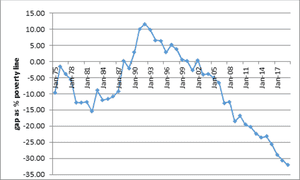Extract from The Guardian
Although the amounts
appear insignificant, the cuts in payments to new welfare recipients
will hit hard for the most disadvantaged Australians

Axing the clean energy supplement will in effect
be abolishing the first real increase in Australian unemployment
benefits in 20 years. Photograph: Mick Tsikas/AAP
Contact
author
Saturday
13 August 2016 09.33 AEST
For
many people, $4.40 a week is a small sum – trivial even. A cup of
coffee on the way to work, the parking change in the car console.
But
for those Australians set to lose between $4.40 and $7.05 a week in
one of the 45th parliament’s first legislative acts, many of them
living below the poverty line, those small sums will make the dire
choices of subsistence budgeting even more desperate.
The
cuts will come from the abolition of the clean energy supplement,
which varies according to the benefit: $4.40 a week for single
unemployed, $7.05 a week for a single person on the aged or
disability pension.
It’s
a lethally clever way for the government to save $1.3bn over four
years from 2.2 million of the most disadvantaged Australians, with
less political blowback than other blunter attempts at welfare
savings.
It’s
lethal precisely because it seems like an insignificant amount, and
because the cuts apply only to new welfare recipients, so no one
actually loses anything they are now getting.
And,
so the argument goes, the supplement was supposed to compensate for
the carbon tax, and that got repealed, so the clean energy supplement
has become an unnecessary and unjustifiable windfall. Something they
don’t really need or deserve.
Perhaps
that’s why it’s caused barely a ripple.
Except
none of those arguments are true, and none can justify this cut to
benefits, which both major political parties, and even the Business
Council of Australia, have conceded for many years are way too low.
For
those people affected, the amounts are not at all insignificant. For
Rob, a disability support pensioner living in country Victoria and
looking for work, losing $7 a week would mean cutting back further on
heating, or possibly food.
“At
the moment I only heat the lounge room and I set it to 18 degrees
because I can’t afford the bills if I turn it up higher,” he
says. “I budget about $5 a day for my main meals, so I might have
to cut that back, or I might rethink whether I visited a friend
because I might not be able to afford the petrol money.”
Single
parents are already struggling to pay for books or school trips.
And
the impact will spread quickly. An unemployed person who takes a job
and then loses it and reapplies for Newstart will no longer be
eligible for the benefit. The government’s savings are based on
estimates that within four years it will not be paying the supplement
to 2.2 million people who would otherwise get it.
And,
for welfare recipients, it really isn’t a windfall at all. In fact
because of the way the supplement was introduced, if it’s cut they
will be worse off than they would have been if the carbon tax had
never happened. This is because the carbon tax adjustment also took
into account a regular inflation adjustment that would have happened
anyway. So, as
explained in this blogpost, axing the clean energy supplement
doesn’t take away a windfall; it actually leaves a single person on
Newstart $1.80 worse off than they would have been if there had never
been a carbon tax. The whole rationale for the “saving” is false.
And
as well as ushering in a two-tier welfare system, with higher
payments for existing recipients, and lower ones for those getting
benefits after the supplement is cut, there also seems to be a double
standard for what counts as a windfall.
The
carbon tax adjustment payment for welfare recipients is incorrectly
labelled as a windfall that must be removed, but everyone else’s
compensation came in the form of a tax cut, a real windfall, which
they got to keep. So the unemployed person loses $4.40 a week and
ends up behind, but the person earning $60,000 keeps a tax cut worth
about $10 a week and stays ahead.
The
reality of what is being proposed here is even more shocking when you
consider the recent history of Newstart in Australia.
Axing
the clean energy supplement will in effect be abolishing the first
real increase in unemployment benefits in 20 years. The last increase
was in 1994, when it rose by $2.95 a week. Research by the Australia
Institute shows that the cuts will put a family living on
unemployment benefits on a historic 32% below the Henderson poverty
line, exacerbating the steady erosion in the value of their payments.
The
graph shows the difference between the Henderson poverty line and the
amount of government assistance going to an unemployed family of four
– two adults and two children. The data beyond 2015 are TAI
projections based on the CPI forecasts in the Budget Papers (which is
used to index unemployment benefits) the assumption that the poverty
line will follow recent trends (at the average increase over the last
20 years). The graph also assumes the government implements its
policy of removing the carbon tax compensation.The Australian Council
of Social Service says the cuts are unconscionable and contradict
repeated agreements from governments, business and unions that
unemployment benefits should rise.A poll by the Australia Institute
in Tasmania shows 60% of voters do not support the cut. But in the
dying days of the election campaign, despite committing to review the
adequacy of unemployment payments, Labor included the savings from
cutting the clean energy supplement in its own budget calculations,
giving the Turnbull government a powerful case to argue that the ALP
should now back the legislation.So the 45th parliament will begin
with legislation to reduce tax for people earning more than $80,000,
and $48b in tax cuts for companies, and also $1.3m in “savings”
from mean incremental cuts to the meagre payments to the most
disadvantaged Australians, many of whom are already living in
poverty. Is that really how it wants to start? And should those of us
for whom $4.40 is loose change allow that to happen?

No comments:
Post a Comment